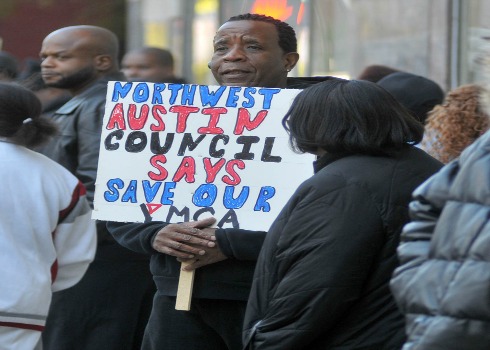
By Todd Thomas
The recent closing of the Austin community’s YMCA came as a surprise to some in the community who said officials did not inform them of their plans in a timely manner.
Members were notified of the closing in early August and had their memberships transferred to the McCormick Tribune YMCA. They also received their first three months free of charge.
The YMCA of Metropolitan Chicago chose to close the 87-year-old in the Austin neighborhood, residents contended.
“We heard about it on Oct. 1, that they were closing. We feel disrespected and we feel like we’re being abandoned by the YMCA organization because they did not have any community meetings to let us know their issues,” said Pastor Steve Epting of Hope Community Church.
They did meet with YMCA Chief Executive Officer Dick Malone, and he told them the facility closed because of low membership and an aging facility. But community organizers, who have organized a protest against the Y’s closure don’t agree.
They said many young men used the gym, they just were not formal dues-paying members.
“The membership piece is a little misleading because most of the kids paid $5 to get in the gym on a daily basis. They weren’t really members, but they used the gym regularly to play basketball, and if they didn’t have five dollars they let them in anyway – the gym was packed,” said the Rev. Marshall Hatch of New Mount Pilgrim Baptist Church.
Organizers also stressed the Austin community can ill-afford to lose a place that acted as a safe haven for youth in the community as they try to avoid the violence that plagues the area.
“The last community in the city that needs to lose a YMCA is Austin,” said Hatch. “Austin has the largest population in the city with 117,000 residents and it has a very young population so if there’s a place that needs a YMCA, it’s Austin.”
But YMCA officials said that the low-membership just couldn’t justify keeping the facility open.
“The member center closed Oct. 1 because of diminished membership use, coupled with an aging facility,” said, YMCA communications manager, Jill McDonnell.
“At the time of its closing the Austin YMCA had only 175 members, only one-tenth the members of a typical Y.”
The YMCA has also transferred ownership of the building to Single Room Housing Assistance Corporation of Chicago (SRHAC) so the residents of the Austin Y will continue to have permanent supportive housing services in the building at their same rent and utility levels.
But people in the community that disapprove of the situation don’t see the closure as a seamless transition. They said they need the facility, or even a newer, better facility to serve the Austin community.
“To have it remain or transformed as an single room occupancy (SRO) is fine, but much more than that is needed,” said Hatch. “And to abandoned the youth mission at a time when we have so much youth violence in Austin is almost criminal.”
“What we want is a new facility with exercise programs, housing for brothers and sisters who are down on their luck at the moment, and programs for young people, and we need a new facility to do that,” said Elce Redmond, of the South Austin Coalition.
Over the past two weeks Austin residents, church leaders and State Representatives have protested outside of the Y’s office at the Lawson House YMCA on Chicago Ave. They want to their message heard, and they also want another meeting with Malone.
“We’re not here to necessarily paint a bad picture of the YMCA,” Rev. Epting said at the most recent protest. “But we want the attention of the YMCA and we want to let them know that our community matters.”
A statement released by the YMCA of Metropolitan Chicago after the Oct. 11, protest stated:
“We understand that the community members who came to YMCA of Metropolitan Chicago offices today are upset about Metro Y’s decision to close the Austin YMCA membership center. We met with community leaders last week, and have invited government leaders and others to meet next week to continue the dialogue about additional ways the Y can expand its impact in Austin.”